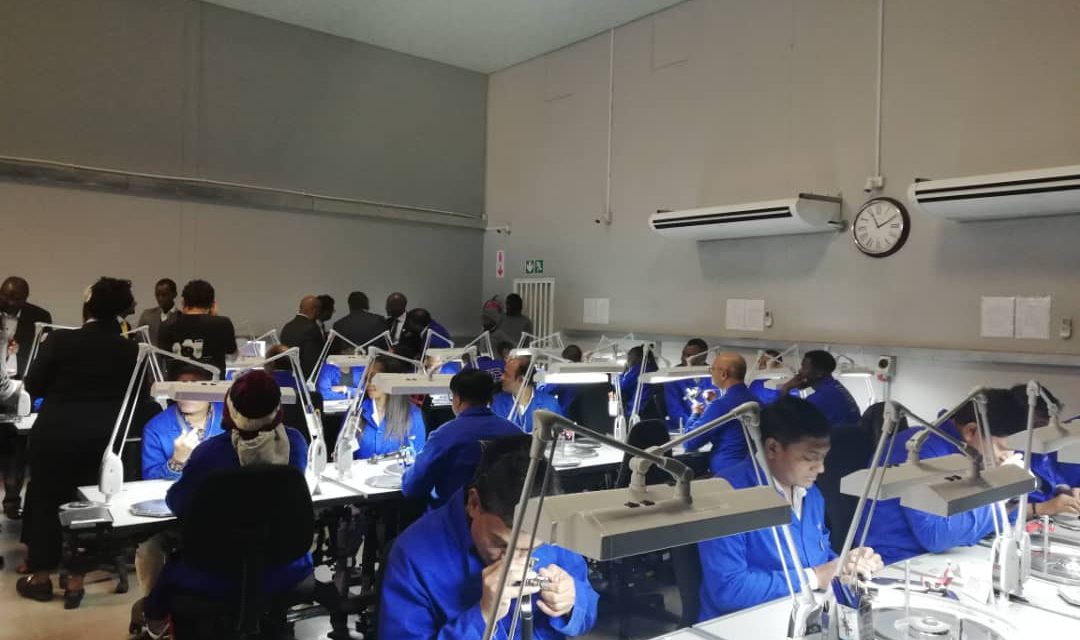
We need more of our diamonds to be cut and polished locally – Alweendo

By Clifton Movirongo.
The Minister of Mines and Energy Tom Alweendo last week Friday officially inaugurated Finestar Jewellery & Diamonds Namibia where he delivered a keynote address and implored the diamond industry to start cutting and polishing more diamonds locally.
Alweendo said that since the very first diamond was first discovered in Namibia in 1908, diamond mining has played an important role in the country’s economy, as it currently represents 25% of Namibia’s export from the mining sector.
According to him, in the 20/21 fiscal year almost 20% of corporate tax came from the diamond industry. “There is therefore, no doubt that the diamond sector is one of the most important sectors in our economy,” said Alweendo, adding that currently, Namibia has 11 active cutting and polishing companies with over 900 people employed.
“I believe that we are at a stage where we need more of our diamonds being cut and polished in the country, thereby creating more needed employment,” he said.
Additionally, Alweendo emphasised that full collaboration is needed with those companies that have invested in the industry. “For example, the current arrangement is that, for certain justifiable operational reasons, companies can be allowed to export a certain percentage of the diamonds they have purchased from the NDTC in rough. This was done to allow companies time to improve their operational efficiencies such that all their purchased diamonds are cut and polished locally.”
“We recognize the significant investments and commitment made by Finestar since their inception in 2017 when we awarded them the cutting and polishing license. This move was to secure a new vibrant company not just to fill the gap in the industry but also to introduce next-level technology and niche products to be established in our country,” he said.
The minister added that in 1994, the government took a decision to capture as much value as possible from the diamond mining sector by requiring that a certain percentage of the diamonds must be cut and polished within the local economy.
Meanwhile, according to Alweendo, some of the companies tend to abuse this concession and continue to export diamonds in rough form, instead of cutting and polishing them locally.
“We will start to be stricter with the conditions under which this concession can be utilized; and will demand that all diamonds purchased from the NDTC are cut and polished locally,” he added.
The inauguration of Finestar’s diamond cutting and polishing factory carries a lot of significance to the country’s economy with reference to the creation of jobs. Moreover, the company injected a total of N$31,679,318 investment during its inception stage, hence, benefitting local contractors and service providers.
Finestar, an Indian diamond manufacturer and trader, has employed 50 skilled local employees with 35% of that total being women. The factory specializes in 1 carat plus stones and has a monthly polishing capacity of 1000 carats in the diamond sector.
“We came here with one clear vision to create a sustainable business in Namibia. Today we have a fully integrated self-sufficient manufacturing operation. We are gratified to be entrusted with the highest quality of rough that comes out from Namibia and immensely proud of our artisanal craftsmanship to produce remarkably polished stones.” said Gaurav Jain, Finestar Director.
The factory processes and polishes rough fine and unaggregated bands in rounds as well as fancy shapes. “We are even making large-high-quality stones above 5 carats and have managed to manufacture up to 12 carats polished stones,” Jain added.
“Our cuts, across all shapes, are refined in a way to enhance the fire, brilliance, and lustre; which consumers across the globe admire & appreciate,” said Finestar Chief Operating Officer Nilesh Chhabria, adding that “we use cutting-edge machinery at all our manufacturing facilities and have set up an infrastructure with the best technology in the industry here in Namibia as well.”
“Value addition and local beneficiation remains our core objectives and the Ministry has made significant progress in the areas of export facilitation, beneficiation, diamond sales, valuation, customs and excise, compliance policy, and flexibility during the challenging covid period to create an enabling environment and boost regulatory efficiency and diamond output,” said Alweendo.












































